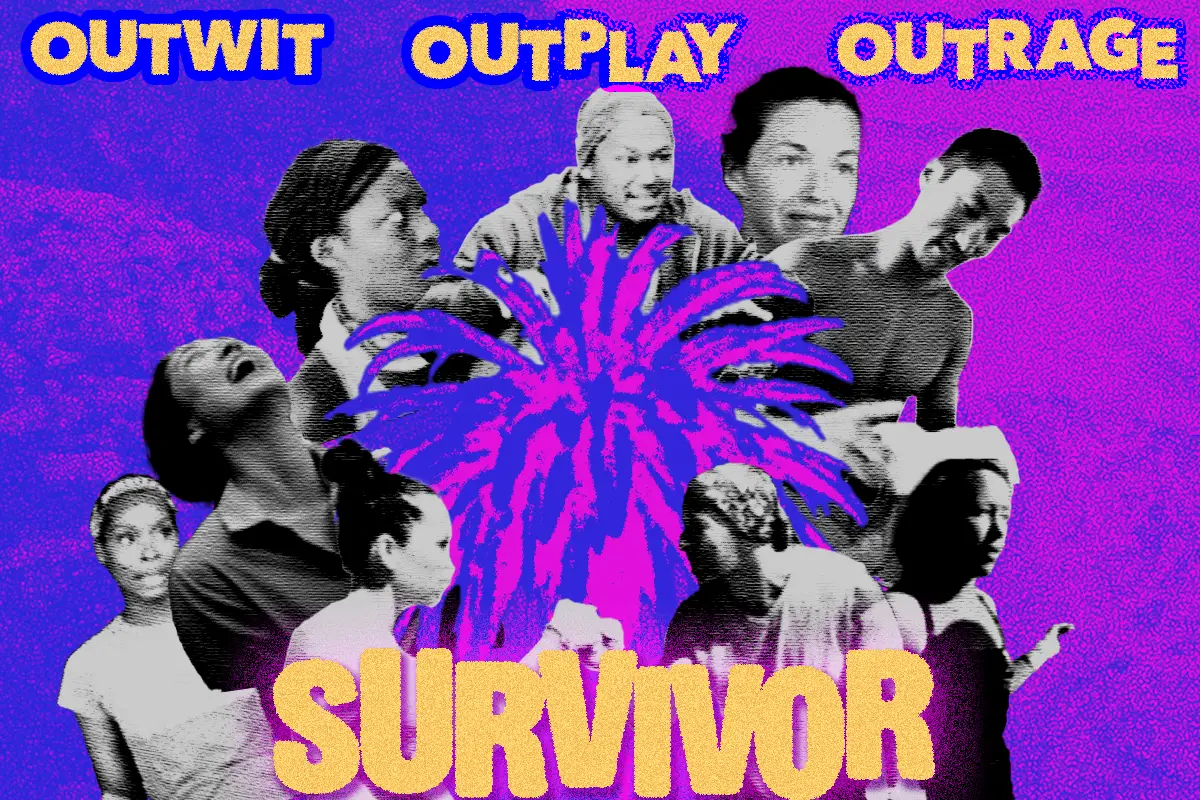It’s hard to undersell the cultural shift that occurred when Survivor first aired on television 23 years ago. The premise of the show has always been simple: how do you betray your friends and then convince them to give you a million dollars?
Contestants today are still trying to answer that question, and audiences are still searching for the answer. The show is a stalwart of reality television programming, and has changed our relationship with the genre by broadcasting the message that anyone could be on Survivor. It was a show built on uplifting normal, everyday people into an extraordinary situation. And even more fascinating—what would these normal, everyday people do to win a million dollars?
As it turns out, quite a lot.
Contestants have done everything from fake a family death to flirt their way to the top. But with 23 years under its belt as America’s favorite reality show, the network has run into more than its fair share of trouble when handling important topics of conversation like racism, sexism, and assault. Because the show is run on strategy, oftentimes women, people of color, and members of the LGBTQIA+ community have had their identities weaponized to further their or someone else’s advantages in the game.
It shouldn’t sound surprising that white men have historically been the winners of Survivor. Women have won the show a grand total of 17 times, or 39%. As one person pointed out in a 2020 statistical analysis, women only received votes in Final Tribal Councils 20% of the time, despite making up 42% of the overall finalists. Common criticism of the show revolves around its double standards when it comes to men and women. The show didn’t even have its first openly non-binary cast member until 2021, two decades after it aired on screens for the first time.
Many women contestants have spoken out about the way they were treated on the show, citing outdated gender models as a barrier to opportunity for them. Several former female players mentioned that tribes often rely on primitive group roles, with men volunteering to go out and hunt and search, while the women stay back and gather. This model is not only steeped in sexism, but prevents women from being able to gain advantages in the game, as idols are often hidden in spaces around camp. In season 39, known as Island of the Idols, the eliminated Vince Moua referenced an instance of this happening, where a fellow contestant said “Okay, the guys are all gonna go gather stuff and the women are gonna stay here.”
Women have also called out Survivor’s double standard when it comes to method of gameplay. A sentiment shared by losers and audiences alike is that juries and tribemates reward aggressive behavior from men in the game, while women are demonized for employing the same strategies.
One of the all-time great Survivor players, Parvati Shallow, has had her gameplay repeatedly reduced to flirty tricks when people assess her path to victory. Shallow used her charm and beauty to her advantage, but the show didn’t hesitate to double down. Producers consistently panned to shots of her body in slow-motion takes, or homed in on how she wore only a bikini during challenges.
In a tribal council on season 34, Game Changers, Survivor veteran Sarah Lacina spoke to the gender politics that run deep on the show:
“If a woman in this game lies or cheats or steals, then she’s fake and phony and a bitch. If a guy does it, it’s good gameplay. If a guy does it, he’s a stud. What it is, is a gender bias, and it holds women back from how they should be allowed to play the game.”
Lacina went on to win that season, and has since been hailed for her strategy of getting close to contestants on a deep emotional level before betraying them. In Survivor season 40, when she came back to play Winners At War, she teared up at tribal council when describing the microaggressions she experienced as a woman playing the game, both on and off the screen. Even when trying to relate, one of her fellow tribemates, Tony Vlachos, said that women needed to be respected because they were “mothers and daughters,” stripping them of their rights as individuals and still defining their worth by their relationships to men. While validating to hear Lacina share her experiences, the conversation spoke to a fundamental problem in the show’s format that had existed for far too long.
Jeff Probst has been open about many of the show’s early mistakes when it came to handling contestants’ identities sensitively. Former players have called out Probst for referring to the men by their last names as a display of brotherly camaraderie, and calling women exclusively by their first names.
While not intentional on Probst’s part, he admitted that he saw the flaws in this form of implicit othering: “I am certain if I look back at all of the comments I have made over 20 years, I would find the exact same bias in me — who I call by last names. Guys have different relationships with each other, and I might not know how to have that relationship with a woman.”
When it comes to correcting and recognizing gender bias, Probst has been open about wanting to do better.
“I’ll definitely own the fact that I don’t think I saw it when Survivor started, and I don’t think I even knew I was supposed to look for it,” said Probst. “But I’m very much aware of it now, and I’m grateful that we can open up and investigate, even though it comes with crisis or it comes with hardship or it comes with some tears.”
The show has taken greater strides in recent years to combat sexism, but one of the biggest criticisms from contestants has been the lack of support they received for undergoing traumatic experiences on Survivor. All the way back on Survivor Allstars, season 8, contestant Sue Hawk was met with silence from her fellow competitors after Richard Hatch pressed his naked body to hers during a challenge and she expressed her discomfort.
When Jeff asked how she was doing, she responded, “I was violated, humiliated, dehumanized and totally spent, Jeff. It wasn’t sorta, Jeff… There’s no way I can continue with my emotions pushed into the ground that much.” Sue would leave the show soon after this event, with the producers doing little to address Hatch’s behavior.
Unfortunately, it wouldn’t be the last time something like this occurred on the show.
Kellee Kim appeared on season 39 of Survivor as a strong contender, until she voiced her discomfort with fellow contestant Dan Spilo’s non-consensual touching of her during the game. Kim repeatedly spoke out about these assaults, and when she tried to voice them to her tribemates, they saw this as a chance to further their own gameplay. Kim was voted out soon after sharing what had happened to her, and the game continued. Not much later, Spilo was forcibly removed from the game after an off-screen incident with a show producer.
This incident with Kim cast a large shadow over the season, which had been looking to be one of the better ones until the series reverted to the historical tradition of silencing women. In the aftermath, Kim spoke about how what hurt her most was the way her complaints about Spilo went ignored: “I wanted to be supported and believed, but I wasn’t, and now my Survivor experience is defined by sexual harassment.” Kim was not offered any assistance after the show finished airing.
The show has forced multiple people, not just Kim, into spokespeople for their groups. Often contestants who experience microaggressions find themselves having to explain on national television why certain treatment is not okay. Survivor’s producers often capitalize on these moments to showcase their allyship, but efforts have clearly been misguided.
Queerness has not been treated with the care it deserved by the show. Zeke Smith, a contestant on Millennials vs. Gen X and Game Changers, was publicly outed as transgender in a poor attempt at gameplay by fellow contestant Jeff Varner. While Smith appreciated that the show was quick to criticize this snafu, he is still working through the real-life implications of someone’s failed strategic move.
“There is a significant toll that the game takes on your mental health, especially as the game has gotten more cutthroat,” said Smith. “I was lucky enough to be given a therapist for a year afterward, but my work isn’t done, I’m still working through it.”
The show has also faced increased scrutiny in recent years for its mishandling of race. The facepalm moments started all the way back in 2006, when season 13, Cook Islands, made the decision to split castaways into four tribes with divisive labels: Caucasians, Asian-Americans, African-Americans, and Hispanics (which is not even a race). Turning racial politics into a publicity stunt did not go over well with viewers and forced those cast to feel like they were representative of an entire group of people. Despite the far-fetched concept producing its first (and only) Asian American winner in Yul Kwon, the season was still tokenism in its most primitive form.
Critics of the show have lambasted its edits of people of color, particularly Black people. Missy Bryd, a contestant from Island of the Idols, felt “more of an obligation to educate” than to win, often explaining to fellow castaways the motives behind microaggressions and feeling the pressure to represent her race for viewers at home.
What should have been her own unabashed experience of a game became a lens through which she realized the biased storytelling Survivor producers used when creating her edits. “I was cutthroat, I played hard, but my edit only showed that side of me…I was stereotyped as scary and angry and I can feel it still,” said Byrd.
Many castmates of color have experienced similar stock edits. J’Tia Hart, a contestant from season 28 Cagayan, was portrayed as lazy and useless to her fellow castaways, despite being on the Brain tribe and her outside career as an engineer.
Today, Survivor loves to tout itself as a show built on revealing the fundamental elements of human nature, and maybe that’s true. Loyal viewers have seen it evolve from its humble origins as a simple social experiment to a larger-than-life television behemoth that puts a magnifying glass on the worst and best parts of what humanity has to offer. The prejudice, the scheming, the camaraderie, the catharsis—it’s all there. But a reckoning is still due.
The sexual assault of Kellee Kim only happened 3 years ago. Winners of color are still few and far between, and often get the short end of the editing stick. If the show truly wants to call itself emblematic of today’s America, it needs to do a lot of work behind the scenes to make things right. From providing mental health support and a built-in support system for survivors of sexual assault, to instating more producers of color to ensure that edits do not perpetuate stereotypes, the list for Survivor to tackle goes on and on.
It’s clear the show has a long way to go in terms of representation and support for its contestants. Hopefully, future seasons will learn from the past instead of repeating it. Viewers and contestants should still be wary that while the promise of a million dollars seems fun to play for, it is never without a cost.

















